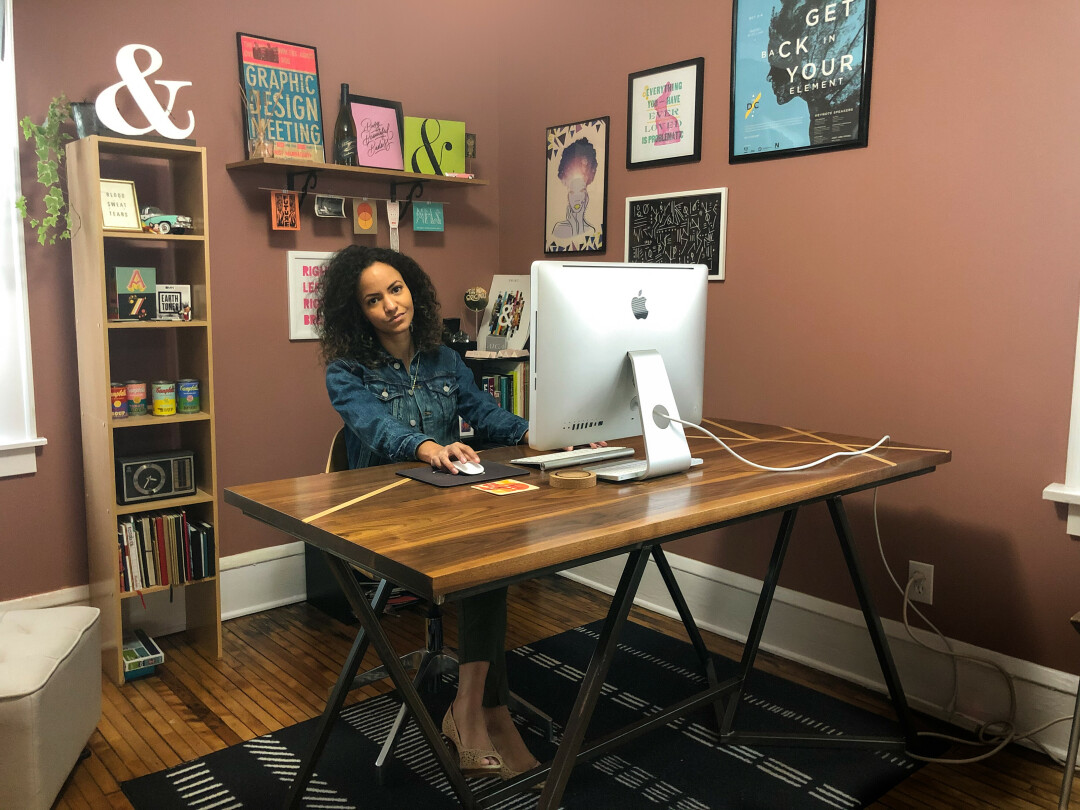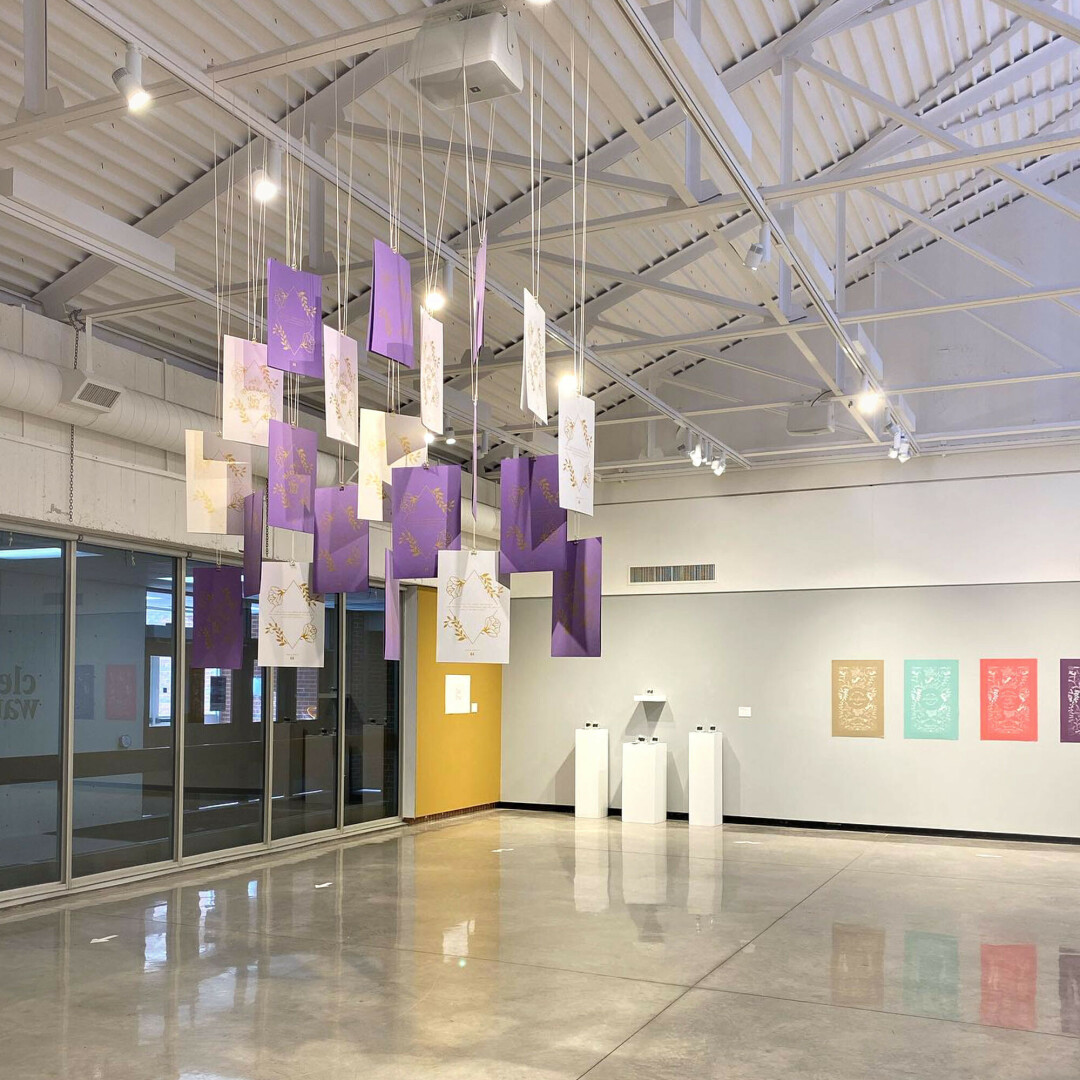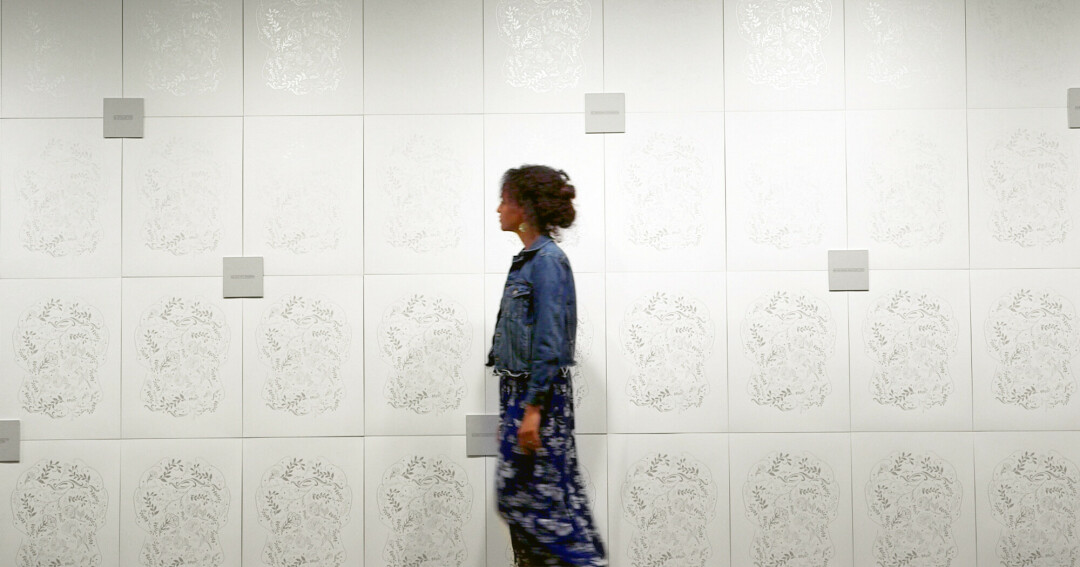Minneapolis-Based Designer Explores Racism’s Impact in EC
‘I’ve always viewed learning as a way to heal,’ says artist Melanie G.S. Walby

“It is as if I had been looking at a fishbowl – the glide and flick of the golden scales, the green tip, the bolt of white careening back from the gills; the castles at the bottom, surrounded by pebbles and tiny, intricate fronds of green; the barely disturbed water, the flecks of waste and food, the tranquil bubbles traveling to the surface – and suddenly I saw the bowl, the structure that transparently (and invisibly) permits the ordered life it contains to exist in the larger world.”
Minneapolis-based graphic designer Melanie G. S. Walby explores Toni Morrison’s analogy of racism to an idyllic fishbowl in her new design exhibit, “Clear Water,” which runs from Feb. 1 through March 7 at the Foster Gallery at UW-Eau Claire.
“There’s complexity in that,” Walby said. “I liked growing up in Eau Claire, and people were racist to me. Not either/or … There’s not enough space for those multitudes when we have to choose sides. And that’s not realistic to reality, because everything is not black and white. And I should know that, because I’m a mixed-race woman.”
Though Walby was born in North Carolina, she spent a good portion of her life in Eau Claire, and traces many of her artistic roots to the prolific art programs and art scene in Eau Claire. An active participant in the art club at Memorial High School, Walby decided to pursue graphic design at the Arts Institute International Minnesota in Minneapolis. Since graduating, Walby has created an extraordinary design career for herself: She currently works as the Design Director at Pollen Midwest, a media arts nonprofit that dedicates itself to telling authentic stories.

“When you hear about somebody who experienced something, it’s so different than hearing about somebody who researched something,” she said. “When you connect it to a human, that pulls at your emotions in a way that really can only happen if someone who lived through the experience is telling the story.”
She has served on the board of AIGA Minnesota as the Director of Sustainable Design, recently was named one of AdFed’s “32 Under 32.” But her work is about more than telling important stories. It’s about constantly learning and evolving.
“I’ve always viewed learning as a way to heal,” she said. “I didn’t start doing social justice work because I wanted to do social justice work; I started reading about racism because I was trying to understand how to heal from what was happening to me.”
”
"There has never been a more serious time to take being a designer seriously.”
Melanie G.S. Walby
Walby felt called to create an exhibit at UW-Eau Claire after seeing the racist Snapchat conversations that were leaked from members of the Blugold football team in 2019.
“I did notice the way that people were posting about it,” she said. “And it felt to me like the general narrative was: These individuals did this thing. It was handled. Racism is solved for the day, let’s move on. And that really bothered me because I would have liked to see more conversations about the culture that creates an environment where people can make it all the way to that age still thinking that jokes like that are OK. And the reason that that bothered me is because that very same culture is what allowed space for all the racist things that happened to me in my childhood (in Eau Claire).”
Walby explores her personal experience with racism in Eau Claire through a piece called “Too Sensitive,” which was inspired by the racism she has experienced throughout her life that no one knows about. If people knew about those things, she ponders, would they call her “too sensitive”?
Though the pandemic delayed the exhibit – and 2020 revealed even more systemic racism throughout the U.S. – Walby holds firm that her exhibit isn’t a response to the past few years; it’s a reflection on an age-old problem.
“(Segregation) is not something I learned about from books and school,” Walby said. “It happened to my dad. And my aunts and uncles. And my grandmother. All of their friends. Everyone they know at church.”
Walby’s exhibit is designed to feel as if she is speaking to another Black woman, she said, to be a validation and reminder for people of color to rest and heal. Though her work primarily focuses on race and her own experiences with racism, she also explores intersections with sustainability and religion.
“It just goes back to understanding the impact that every decision every single one of us makes, and being able to not think about those things comes from a position of not directly experiencing the consequences,” she said. “So the more you learn more about the consequences, the more you learn about learning to care about other people. And it’s part of loving your neighbor.”

Walby gave a unique virtual artist talk, featuring music and opportunities for healing on Feb. 18 (which you can view at melaniewalby.com/clear-water). There will also be a virtual panel discussion at 7:30pm on March 4. (Preregister for that at uwec.ly/tickets.) Initially, Walby planned to bus fellow BIPOC friends, neighbors, and artists from Minneapolis and Madison to see the exhibit and empathize in common experiences, but because of the pandemic, Walby decided to change gears to create a more healing experience. Breaks in her artist talk are filled with hymns to relieve tension and to feel similar to church.
“What we consume affects how we view each other,” Walby said. “It’s really important to pay attention to what media you’re taking in. Is this created by somebody who has expertise on these communities, or is it somebody who’s creating something about a community? And if so, is this an accurate portrayal and a good resource for me? Or should I do a little bit more research to find out the truth? We live in a really scary time where it’s very obvious that you don’t have to do research to find the truth if you don’t want to, and the consequences are deadly. There has never been a more serious time to take being a designer seriously.”
"Clear Water" will be on display at UW-Eau Claire’s Foster Gallery until March 7.






















